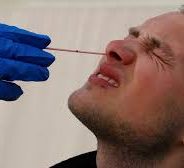A World Health Organiation-sponsored survey of more than a million Internet users worldwide has found that most people simply cannot view enough photos of various global peoples getting coronavirus swabs jammed deep inside their nasal passages.
Of those surveyed, 67 percent said they thought it was “really neat” to see people of all stripes – be they American, Canadian, Indian, Indo-European, Lesothoan, Mongolian, Urdu speakers and especially Kurile Islanders – having the comically long semi-rigid medical devices stuck so far up their noses that it gave them an empathetic pain and made them feel more a part of the global community than if they, for example, actually traveled to another country or formed a friendship with a person not from their immediate family, clan, neighborhood or Liverpool Football Supporters Club.
“What a wonderful thing we have this opportunity to really feel part of a truly international tribe of oneness by feeling the unique pain that comes with having nasopharalyngeal testing done while a staff photographer from Agence France-Presse or Reuters thrusts a large-format digital camera straight into your face for the whole world to see up close this painful diversion from reality,” said one of the poll respondents, Neef VanderKaafen of Rotterdam.
“I can almost taste it somewhere between my back teeth and my amygdala whenever I see such a photo, and I can tell you it only make me yearn for more just like it.”
Another respondent, Luwaku Nimbabtsu of Harare, Zimbabwe, said she felt a flush of excitement at such photos, especially when they were done as closeups and she could see the not insgnificant dribblings of mucous almost slipping off the swab itself as it is extracted from an especially phlegmatic nose by whatever highly trained medical technical is administering the test.
Nimbatsu said she was now collecting such photos as digital assets in the form of non-fungible tokens, which she hoped to sell for hundreds of thousands of dollars to future global peoples interested in how earlier international communities formed bonds through the shared fascination for seeing other people’s boogers being poked at during medically transformative interventions.
